虛擬主機、VPS 與 CDN 產品介紹
虛擬主機與 VPS 能當 CDN 嗎?
虛擬主機和 VPS 都可以作為 CDN 的一部分,但它們扮演的角色和適用的情境有所不同。以下詳細說明:
CDN 是什麼?
CDN(Content Delivery Network,內容傳遞網路)是一種分佈式伺服器網路,透過將網站內容儲存在多個地點的節點,實現快速、穩定的內容傳遞。當使用者請求網頁時,CDN 會自動將請求導向距離最近的伺服器節點,以縮短傳輸距離並提升使用者體驗。

CDN 的功能與優勢
01
提升網站載入速度
使用者可從最近的節點取得資料,有效加速網站載入,改善瀏覽體驗。
02
減少延遲與頻寬負載
透過分散流量,緩解頻寬擁堵,讓全球用戶都能快速存取網站內容。
03
提升網站安全性
CDN 會過濾進入網站的流量,幫助防禦 DDoS 等攻擊,並確保服務穩定不中斷。
04
減輕伺服器壓力
CDN 緩存靜態資源(如圖片、影片、CSS、JavaScript 等),降低對原始伺服器的頻繁請求。
虛擬主機與 CDN
虛擬主機通常不適合直接作為 CDN 的節點。虛擬主機通常資源有限,且與其他使用者共享伺服器資源,因此難以提供 CDN 所需的穩定性和高效能。
虛擬主機比較常扮演「原始伺服器」的角色。你的網站檔案(例如 HTML、CSS、JavaScript、圖片等)會儲存在虛擬主機上。當 CDN 的節點沒有使用者請求的內容時,會向原始伺服器(也就是你的虛擬主機)請求內容。


VPS 與 CDN
VPS(Virtual Private Server)比虛擬主機更適合作為 CDN 的節點。 VPS 擁有獨立的資源和較高的控制權,可以更好地滿足 CDN 對效能和穩定性的要求。
你可以使用 VPS 搭建私有的 CDN,或作為現有 CDN 服務的補充。 例如,你可以使用 VPS 儲存網站中較不常變動的靜態內容(例如圖片、影片等),並將其配置為 CDN 的一個節點。
如何運用 VPS 作為 CDN 的一部分?
選擇合適的 VPS 服務商
選擇網路速度快、資源(例如 CPU、記憶體、儲存空間) 穩定的 VPS,並確保地理位置分佈能覆蓋目標用戶。例如,若用戶主要分佈於亞洲和歐美,可在這些區域選擇多個 VPS 節點。
安裝 Web 伺服器軟體
在 VPS 上安裝 Web 伺服器軟體,例如 Nginx 或 Apache,這些伺服器軟體能提供高效能的靜態內容傳遞能力,並支援快取配置。
配置快取功能
設定 Web 伺服器的快取功能,將使用者經常請求的內容儲存於節點上,減少重複請求原始伺服器的次數。
使用 CDN 軟體或服務
你可以使用開源的 CDN 軟體 (例如 Varnish 或 Squid)或使用商業 CDN 服務(例如 Cloudflare、AWS CloudFront),將 VPS 整合到 CDN 網路中。
設定 DNS 導流
配置 DNS 記錄,確保使用者請求能自動導向離他們最近的 CDN 節點 (包括你的 VPS),提升訪問速度。
持續監控與優化
使用分析工具(如 GA4 或 Pingdom)監測各節點效能,針對高流量或延遲情況進行調整,確保網路穩定性。
還不知道要選擇 VPS 或 虛擬主機嗎?
虛擬主機與 VPS 在 CDN 網路中的適用場景不同,透過適合的配置,都能改善網站性能、提升用戶體驗並保障網站安全!若您想了解更多 VPS 與虛擬主機,歡迎來電 4499-343 (手機撥打請加 02)或與遠振線上客服諮詢。








